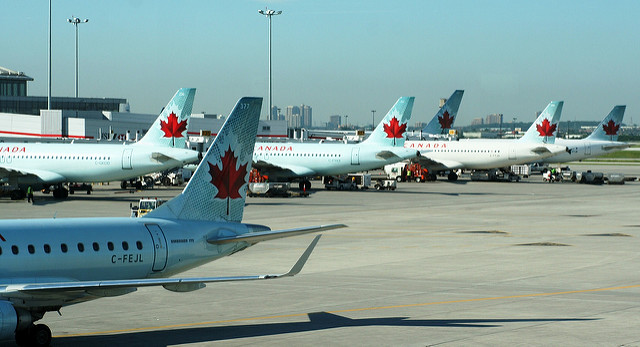Like this article? rabble is reader-supported journalism. Chip in to keep stories like these coming.
It has now been five months since we started hearing and reading about Canadian kids affected by additional security screening measures when they try to board a plane, and unfortunately, the situation hasn’t improved much since.
Adam Ahmed, a 6-year-old boy and hockey fan of the Montreal Habs, almost missed his flight in December 2015, because his name was on the “no-fly” list, apparently similar to a “suspected terrorist.” In other words, Adam Ahmed is a “false positive,” a person who shouldn’t be on the Passenger Protect Program (PPP), but for unknown reasons, he is.
At that time, his mother, Khadija Cajee, who took the lead in denouncing the situation imposed on her son for many years, was joined by families with similar shocking stories regarding their infant, toddler or teenager being stopped before boarding a plane and subject to extra security measures — with all the humiliation and stigma surrounding it, before finally being let go with the prospects of a repeated scenario each time they travel.
Under the Conservative government, none of these stories were disclosed. Probably, many of the parents didn’t have any hope of change by telling their stories and demanding answers, or they were scared to speak out, as the political climate was quite heavy.
But, after the Liberals were elected, the political discourse changed and a lot of hope returned for many of these parents.
Today, there are 40 families demanding that their kids’ names be removed from the no-fly list. Unfortunately, the government response seems to be slow, shy and somehow confusing.
As a human rights advocate, my position is that the no-fly list or PPP, has never been proven an effective tool to enhance the security of Canadians. We have never seen any numbers of attacks or plots prevented because of the PPP.
Moreover, the program remains opaque and without any accountability, with strong indications that it is based on racial profiling rather then evidence.
Minister Ralph Goodale promised at the March 10, 2016 Leaders’ Summit, held between Prime Minister Trudeau and President Obama, that both countries would create a working group to tackle redress for the no-fly list, improve its transparency and allow passengers to deal with their cases in more efficient ways.
This month, Minister Goodale announced that the Redress Working Group has been formed but we don’t concretely know whether Adam Ahmed and the 39 other kids affected will be removed from the list or not.
Interestingly, we learned that Minister Ralph Goodale puts the blame on the technological aspects of the no-fly list, saying that our Canadian database “was designed to sort of piggyback” on airline computer systems and that implementing an independent database system run by the Canadian government would take money and effort. This newly disclosed fact about the Canadian version of the no-fly list was never invoked previously as one of the problems inherent to it.
Instead, the reason often implicitly suggested was that the Americans might be responsible for those situations, as previously, families were strongly encouraged to contact the U.S. Homeland Security office and inquire about the possibility that their kids are on the U.S. list and how to “de-list” them.
This announcement by Minister Goodale would be the first time Canada acknowledged that these mistakes are solely Canadian problems and should consequently be swiftly and strongly dealt with.
Now that this bilateral group is up and running, it is crucial that a redress system be implemented as soon as possible. The U.S. has one already, so why not Canada? A strong and reliable redress process is necessary; a process that first allows kids affected by these senseless measures to remove their names and travel freely with no hassle.
Moreover, the redress process should be open to all Canadians who have been denied the freedom to travel. These Canadians need to know the reasons behind such listing and should be able to challenge these decisions. The minister shouldn’t have the discretionary judgment to keep any Canadian on such a list, as is the case today.
Minister Ralph Goodale promised parliamentary oversight as a way to find a find balance between security and human rights. Clearly, this is not enough as we can see how every aspect of our lives today is affected by security measures.
For instance in this issue, Transport Canada and the Canada Borders Service Agency are both totally out of the loop. A strong integrated review mechanism that can independently launch joint investigations across agencies to detect fault lines and uncover wrongs is more than just a need — it is a must.
This column was first published in the Huffington Post.
Monia Mazigh was born and raised in Tunisia and immigrated to Canada in 1991. Mazigh was catapulted onto the public stage in 2002 when her husband, Maher Arar, was deported to Syria where he was tortured and held without charge for over a year. She campaigned tirelessly for his release. Mazigh holds a PhD in finance from McGill University. In 2008, she published a memoir, Hope and Despair, about her pursuit of justice, and recently, a novel about Muslim women, Mirrors and Mirages. You can follow her on Twitter @MoniaMazigh or on her blog www.moniamazigh.com
Photo: OZinOH/flickr
Like this article? rabble is reader-supported journalism. Chip in to keep stories like these coming.



